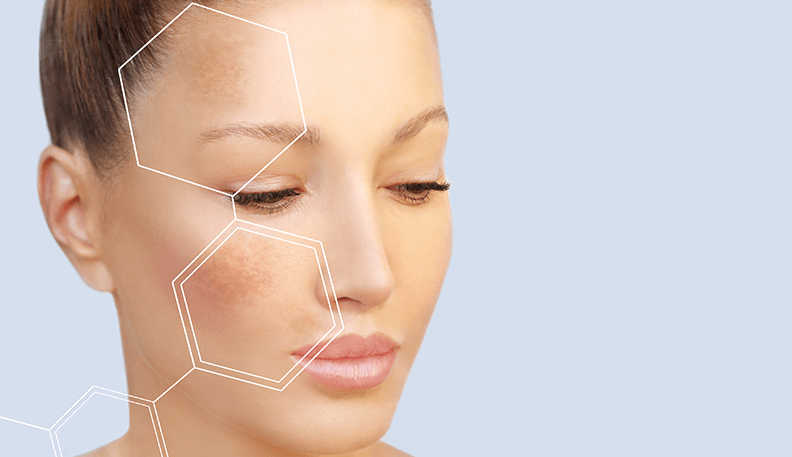Compared to the gold standard mKF, CYS was proven to be 18% more effective and much better tolerated. At both week 8 and week 16, CYS produced significantly greater reductions from baseline in modified Melasma Area Severity Index (
These results were confirmed when compared to HQ4% alone. CYS was shown to be superior in MASI score reduction compared to HQ4%. As per protocol, at the reduction in mMASI score was a 39.1% (3.1 ±1.9) in the CYS group and a 33% (3.2 ± 3.7) in the HQ4% group (P = 0.96). This investigator-driven, double-blinded trial was conducted in Australia on 20 female melasma patients randomly assigned to use either CYS (Cyspera®, Scientis) or HQ4% (4% hydroquinone). Results were published by Dr Nguyen et al, on June 4, 2020 in Australasian Journal of Dermatology (2).
Compared to TXA mesotherapy, significant efficacy in the reduction of melasma was established for the two treatments, with no statistical differences in degree of improvement between the two groups (at week 16, 45.9% CYS and 47.1% TXA meso). No patient in either group had recurrence of melasma in the follow-up period. However, complications were much more frequent in the TXA group. All comparisons showed statistically significant results (P < 0.001). This independent, investigator-driven study evaluated 54 subjects randomized in two parallel groups treated with either CYS (Cyspera®, Scientis) for 16 weeks or in-office TXA mesotherapy (0.05 mL) every 4 weeks for 3 sessions. Results were published on August 26, 2020 in Archives of Dermatological Research (3).
These results confirm the significant efficacy, safety and tolerability of CYS demonstrated first in 2015 by Prof. Mansouri et al in the British Journal of Dermatology, and in every other clinical studies conducted to date (4).
Founded in 2016, Scientis is emerging as the pigmentation authority leveraging on its proprietary cysteamine-based technology. Scientis strives to discover, develop and bring to skin of color patients novel dermo-cosmetic products for skin pigmentation concerns.
- Karrabi M, David J, Sahebkar M. Clinical evaluation of efficacy, safety and tolerability of cysteamine 5% cream in comparison with modified Kligman’s formula in subjects with epidermal melasma: A randomized, double‐blind clinical trial study. Skin Research and Technology. 2020 Jun 25.
- Nguyen J, Remyn L, Chung IY, Honigman A, Gourani-Tehrani S, Wutami I, Wong C, Paul E, Rodrigues M. Evaluation of the efficacy of cysteamine cream compared to hydroquinone in the treatment of melasma: A randomised, double-blinded trial. Australas J Dermatol. 2020 Sep 27
- Karrabi M, Mansournia MA, Sharestanaki E, Abdollahnejad Y, Sahebkar M. Clinical evaluation of efficacy and tolerability of cysteamine 5% cream in comparison with tranexamic acid mesotherapy in subjects with melasma: a single-blind, randomized clinical trial study. Arch Dermatol Res. 2020 Sep 2.
- Mansouri P, Farshi S, Hashemi Z, Kasraee B. Evaluation of the efficacy of cysteamine 5% cream in the treatment of epidermal melasma: a randomized double‐blind placebo‐controlled trial. British Journal of Dermatology. 2015 Jul;173(1):209-17.







